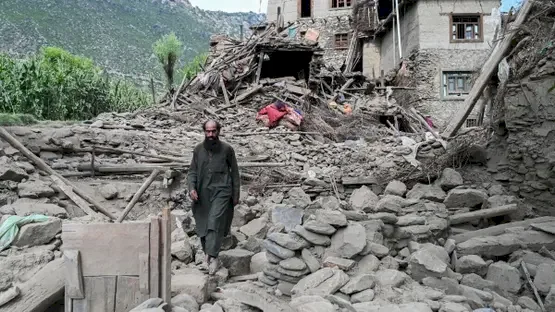
Latest Death Toll from the Earthquake in Afghanistan: Over 1,400 Dead and Difficult Conditions for Survivors
SadaNews - Hope is fading for finding survivors on Wednesday, the third day of rescue operations following the earthquake that struck Afghanistan, leaving over 1,400 dead, while survivors are living in difficult conditions.
After the 6.0 magnitude earthquake that hit eastern Afghanistan on Sunday night to Monday, resulting in more than 1,400 dead and 3,100 injured, a second earthquake measuring 5.2 occurred on Tuesday evening in the provinces adjacent to Pakistan, causing panic again among thousands of families.
Taliban authorities counted 1,411 dead and 3,124 injured due to the deadliest earthquake in the country's history, with almost all casualties occurring in Kunar province, along with reports of losses in Laghman and Nangarhar provinces.
In the Nurgal area of Kunar, several residents remain trapped under the rubble, making it difficult to reach them for rescue, according to senior local official Ijaz-ul-Haq.
Access to some villages and towns is hindered due to landslides.
The organization "Save the Children" reported that members of one of its teams walked twenty kilometers carrying medical supplies on their backs to reach a village isolated from the world due to landslides.
The Ministry of Defense organized 155 helicopter flights over two days to evacuate about two thousand injured and their relatives to hospitals in the region.
In the village of Mazar Dara in Kunar, a small clinic was set up to provide emergency care for the injured, but no tents have been established to shelter the survivors.
In the past two days, Taliban authorities have not announced any plans for post-earthquake recovery, whether regarding financial aid for the affected or strategies for sheltering those displaced, or long-term reconstruction efforts.
The assistant spokesperson for the government, Hamdullah Fetra, stated that a camp has been established in the Khaskunar area to store emergency supplies, while two other centers have been opened near the epicenter of the earthquake for "managing the transport of the injured, burying the deceased, and carrying out relief operations for the survivors."
The United Nations noted that the disaster could have affected hundreds of thousands of people.
Afghanistan, whose authorities are only recognized by Moscow, is suffering from recent cuts in international humanitarian aid, particularly from the United States.
In response to the disaster, all UN agencies have launched fundraising campaigns and allocated an initial amount of five million dollars from the UN's global emergency response fund to assist the affected areas.
However, non-governmental organizations active on the ground confirm that their operations are directly suffering from reductions in international aid budgets. The World Health Organization reported on Tuesday evening that it needs three million dollars to respond to the emergency situation.
On another note, the UN agency warned of the risks of epidemics emerging "among displaced persons who are predominantly vulnerable groups."
Afghanistan is frequently subjected to earthquakes, particularly in the Hindu Kush mountain range, near the intersection of the Eurasian and Indian tectonic plates which accounts for 15 percent of the world's seismic energy.
Since 1900, northeastern Afghanistan has experienced 12 earthquakes with magnitudes exceeding seven, according to Brian Baptie, a seismologist at the British Geological Survey.
In October 2023, a 6.3 magnitude earthquake struck Herat province in western Afghanistan, followed by a series of strong aftershocks, resulting in the deaths of more than 1,500 people and the destruction or damage of over 63,000 homes, according to UN estimates.
That was the strongest earthquake to hit the country in more than a quarter-century, leading to the destruction of nearly 300 schools and educational centers.
Afghanistan faces a severe humanitarian disaster after four decades of conflict. According to the World Bank, nearly half of the country's population lives in poverty.
Following the Taliban's return to power, international aid to Kabul has significantly diminished, undermining Afghanistan's already limited capacity to respond to disasters.

International Calls to De-escalate and Warnings of Serious Consequences After Strikes on I...

Syria: 4 Killed in Suwayda Due to Iranian Missile Strike

Moscow: The Attack on Iran is Dangerous and May Lead to Catastrophe

Closure of Airspace and Interception of Iranian Missiles in Gulf States

Lebanon Rejects Involvement in Regional Conflicts

Jordanian Army Announces the Downing of Two Ballistic Missiles Targeting the Kingdom

Two Explosions Rock Jalalabad in Eastern Afghanistan... Pakistan Denies Its Fighter Jet Cr...

